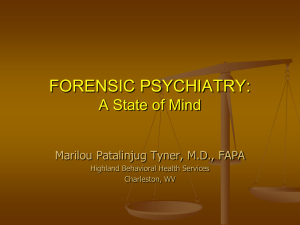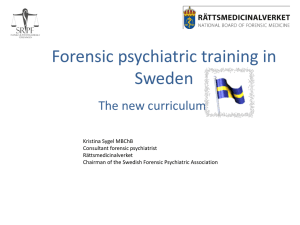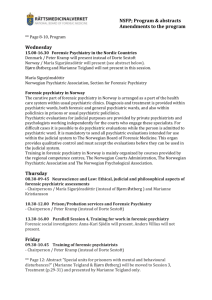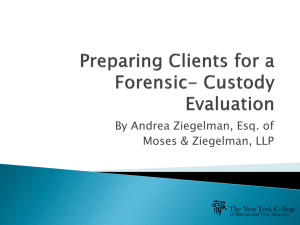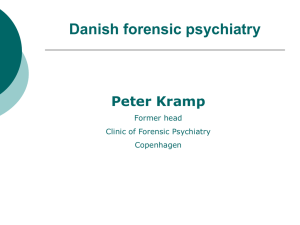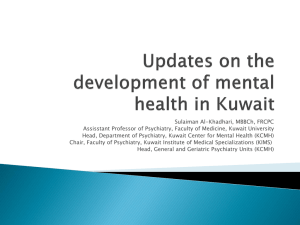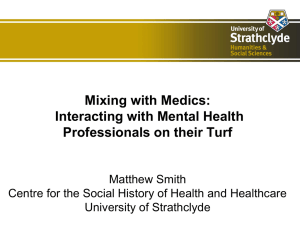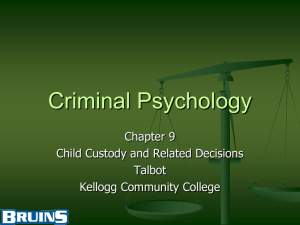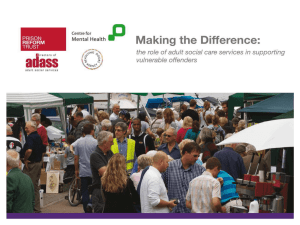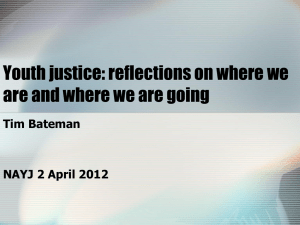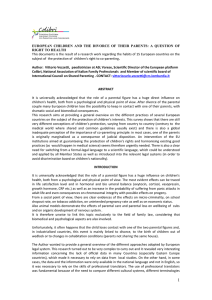Forensic Assessment
advertisement
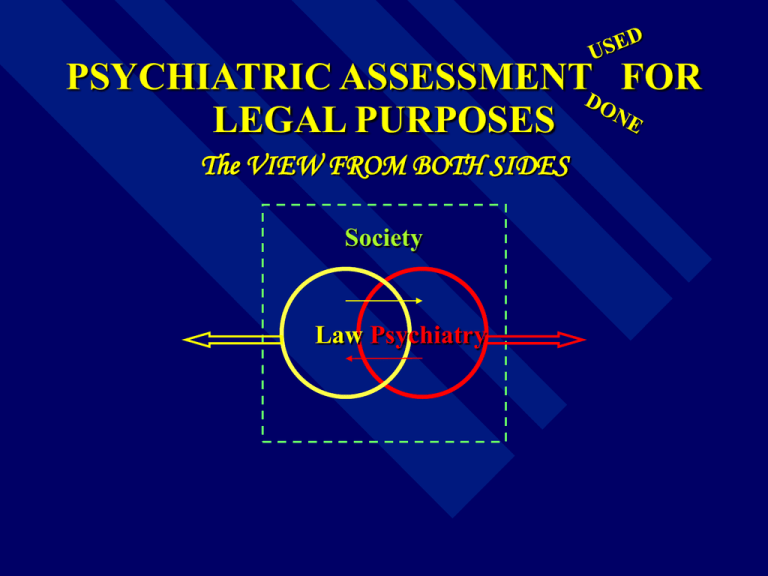
PSYCHIATRIC ASSESSMENT FOR LEGAL PURPOSES The VIEW FROM BOTH SIDES Society Law Psychiatry Families LOSER! “Win-win” means I win twice, doesn’t it? Lawyers Family Court Experts Child Parent Court Custody Evaluator Parent Agency Topics Law & Psychiatry Clinical vs. Forensic Psychiatry Child Custody Determination Special Issue Law & Psychiatry Old History Young Free Will Philosophy Determinism Client Rights Objective Patient Needs Cases & Codes Education Clinic & Lab Adversarial Approach Consensus Sources of Conflict Differences in background, Professional education, and training. Experiences at the interface: legal Inter-Professional regulation of psychiatric practice & psychiatric input into legal decisions. Pre-existing personal issues. Personal Prior negative contacts with “them.” Overcoming Conflict Practice within expertise. Prepare Professional well. Answer the questions. Educate each other. Practice good Inter-Professional conflict resolution technique. Get real! Psychiatrist not opponent. Personal Lawyer not narcissistic threat. Clinical Psychiatry Forensic Psychiatry Ends are medical. Ends are legal. - Doctor-patient relationship. - Focus is on diagnosis and treatment. - No doctor-patient relationship. - Focus is on applying psychiatric expertise to legal questions in legal contexts. Ethical principles Ethical principles - Do no harm. - Best interests - Truth-telling - Respect for person Role of Forensic Psychiatry Assist administration of justice by Goal applying psychiatric expertise to legal questions in legal contexts. Produce targeted medical-legal Objective evaluation, report, and testimony. Apply ethics & practice guidelines of Standard of Care forensic psychiatry. Bias. Speculation. Conflicts of Caveat interest. Expert for own patient. Guidelines of Forensic Psychiatry Not treatment. Limited confidentiality. Full Disclosure Need for informed consent. Address all evidence. Challenge own Honesty findings. Expose limits of certainty. Clinical, scientific, & forensic expertise. Competence Report writing and courtroom skills Identify legal question, legal rules, Framework relevant data, and reasoning process. Child Custody Determination History Best Interest of Child Role of Child Custody Evaluator Uniform Standards Sexual Abuse & Sexual Abuse Allegations History Parental rights. Parens patriae. Family privacy. Mental Health Input Tender years doctrine. Best interest of the child. “Best Interest” Legal Standard or Psychological Premise? Toddler is kidnapped. Kidnapper marries. New couple becomes good psychological parents. Child does well. A decade later, child is discovered. By this time, biological parents are angry, depressed, drink too much and live on fringes of society but they want their child back as a matter of right. Best Interest of the Child Child’s Needs Loving, nurturing, safe, permanent home. Education, health care, spiritual/ethical training. Guidance in interpersonal development. Parent’s Skills View child as distinct being with its own needs. Refrain from using child for self-gratification. Respond to daily needs & protect from harm. Set appropriate limits for welfare of child. Promote relationship to non custodial parent. Role of Custody Evaluator Assist Court resolve custody disputes Goal and protect children from future harm. Produce targeted medical-legal custody Objective evaluation, report, and testimony. Apply forensic and practice guidelines Standard of Care applicable to custody determinations. Bias. Speculation. Conflict of interest. Caveat Serving as expert for own patient. Uniform Standards Legal Case Law California Codes Psychiatric Clinical, scientific, forensic, specific additional areas of training and experience. Fam. Code 3110, 3011, 3118 Rules of Court Rules 1257.3, 1257.4, 1257.7 Competence Standard of Care Practice Parameters for Child Custody Evaluation of American Academy of Child & Adolescent Psychiatry Sexual Abuse & Abuse Allegations Sexual Abuse Clinical impact Legal impact Factor in custody/visitation determination Tactic in custody/visitation dispute Abuse Allegations Overview Forensic assessment Reporting duty Consequences of false allegations The Special Issue Do you think a 40-hour week is a vacation? Do you think going to jail is a good way to relax? Does your blood pressure equal your hourly rate? When your mate asks how you feel, do you say… STOP INTERROGATING ME ! and is this the response you get? Attorney Stress Burnout Secondary Traumatic Stress Impact on Practice Prevention Treatment People v. Arno 90 Cal App. 3d 505, FN 2 “We feel compelled by the nature of the attack in the dissenting opinion to spell out a response: 1. Some answer is required to the dissent’s charges. 2. Certainly we do not endorse “victimless crime.” 3. How that question is involved escapes us. 4. Moreover, the constitutional issue is significant. 5. Ultimately, it must be addressed in light of precedent. 6. Certainly the course of precedent is clear. 7. Knowing that, our result is compelled…” Summary Custody evaluation is a medical legal activity of utmost value to society. Experts need clinical expertise, familiarity with applicable law, and be able to perform consistent with the principles and practices of forensic mental health assessment. Manage stress before stress manages you!
